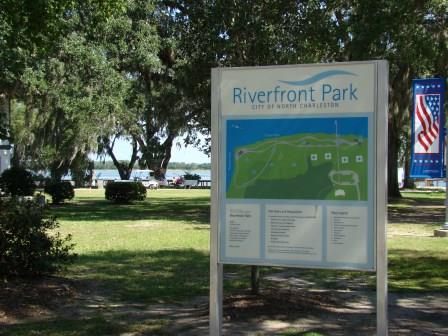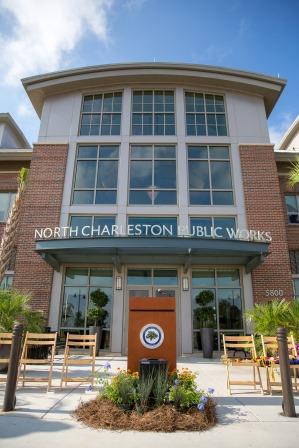In the City of North Charleston, old industrial sites are giving way to new homes, nonprofits, breweries and startups.

Riverfront Park in North Charleston
It's a testament to the 44-year-old city's power of reinventing, reimagining and repurposing. Strategic land gifts and purchases, too, play a key role in the story of how the city is doing it.
A point of view underpins it all: North Charleston is different, and that's all right.
"We don't mind having three different zoning uses next to each other," Ray Anderson, special assistant to the mayor, explained to a busload of local officials participating in a mobile tour during the Municipal Association's Annual Meeting.
"We've embraced it," he said, adding that the city also spans three counties—Berkeley, Charleston and Dorchester.
Anderson said the city's mayor, Keith Summey, "always talks about respect." It's an attitude that threads the city's disparate swatches together.
"As long as the different business people, industrial people and residential people understand, that's just our DNA," Anderson said. As the city expanded north, officials used more traditional land use controls.
"We are a very eclectic community," said Mayor Keith Summey.
Cultural diversity, too, seems to reflect the city's textured identity. The Charleston Naval Base closed in 1996, but the international influence the base brought to the area remained.
For instance, after the base closure, a ship repair company purchased the naval property for $9 million. Anderson said a Taiwanese ship is currently at the facility. The Taiwanese crew is there, too.
"Their kids are in our schools. They'll be here a year," said Anderson. "It's been an interesting transition."
Strategic gifts and purchases
In some cases, the city served as the residential developer. The city purchased Liberty Homes, once a neighborhood of World War II duplexes, for $4.5 million, replaced the infrastructure and created a nationally recognized sustainable, green community.
In another instance, the city is planning to donate land to a community-minded charity. North Charleston will give about 5 acres of land to Water Mission International, a faith-based engineering ministry that designs and builds clean water and sanitation equipment.
"They are an unbelievable company," said Anderson. "We're going to give them the property because of what they do." For instance, the organization assisted in the Columbia area after the flood last October.
"The bulk of their work is international with a local response only coming after natural disasters where safe drinking water is not available," said Ryan Johnson, economic development and public relations coordinator for North Charleston.
Last year the city purchased 24 acres of land in order to donate it to the Medical University of South Carolina for the home of a new pediatric medical campus. The North Charleston City Council voted in February of last year to spend up to $4 million to buy the land.
A tax increment financing district, which generated $139 million, helped pay for a new city hall, along with the new Fire Museum and other projects.
New life for old sites
Evidence of old sites becoming new is everywhere in North Charleston, where thousands of people moved during WWII to work at the Navy base and in the wartime industries.
An industrial district that contained an old asbestos mill where fibers were spun into fire-retardant products has now attracted apartments and commercial establishments, including an outdoor advertising company and a brewery. The former mill building has been placed on the historic registry and will become offices, retail and restaurants.
Five years ago, the city purchased the former Shipwatch Square property. The city's plan is to turn the current "food desert" area into a grocery store. But the process has been challenging, in part due to environmental concerns resulting from a past dry cleaning business. The project reflects a broader reality of repurposing industrial, and even some commercial, sites. "Everything you touch has got a brownfield component to it," said Anderson. "You just have to work through it and make it happen."
The Centre Point area was phosphate mines in the 1920s but today is home to the Tanger Outlet Mall, as well as many other commercial establishments. The mall is part of what drives the city's No. 1 retail business status in the state.
Setting an example
The City of North Charleston's approach to its future goes beyond its plans for redevelopment. The city's relationship with its workforce also figures into the city's broader vision.
For the mayor, that means looking out for the city's nearly 1,100 employees and hoping to motivate the business community to follow suit. A new $42 million public works facility sitting on 35 acres is part of that strategy.

The mobile tour took Annual Meeting attendees past North Charleston's new public works facility.
"Our employees, who were being overlooked, now know that they've got a great place to work out of," said Summey, who was elected in 1994, making him the city's third mayor.
"One of the things that we're trying to do is set an example for private sector, and it's not just in buildings, in maintenance of buildings, and making sure that the easements are cut and cleared. It's also about respecting our employees," he said.
A key piece of that, he said, is his support for raising entry-level city salaries from $11 per hour to $15 over the next three to four years.
"We're not going to mandate the private sector follow us," said Summey. "But if we don't set the example, we'll never see it happen."
